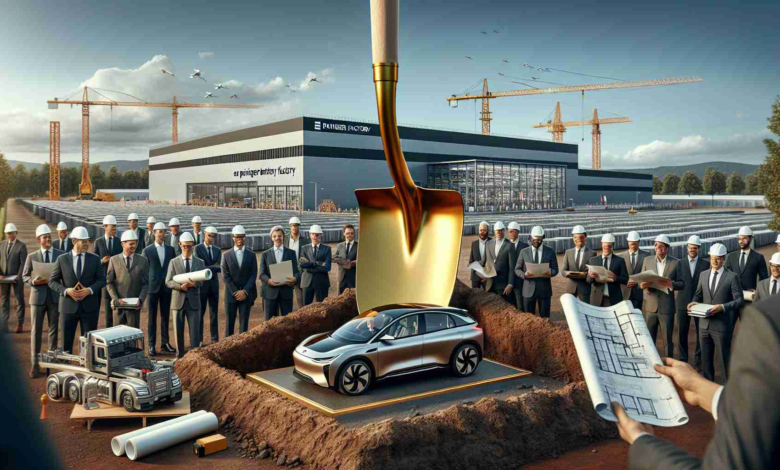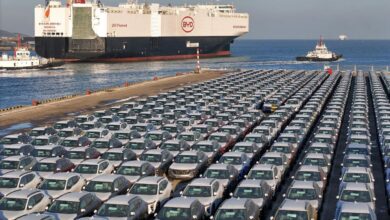Germany Breaks Ground on Pioneering Battery Factory to Power Electric Vehicle Future

Summary: A groundbreaking ceremony in Heide, Schleswig-Holstein marks the beginning of a major battery production facility that promises to reinforce Germany’s green transportation initiatives and create over 13,000 jobs. Chancellor Olaf Scholz emphasized the factory’s central role in the electric vehicle revolution as Northvolt takes charge of the project, signifying economic and environmental advancements.
The automotive landscape is undergoing a significant transformation as sustainability becomes increasingly paramount. Germany has underscored its commitment to this change with the start of a new battery production venture in Heide, led by Northvolt, a Swedish battery cell manufacturer. This facility is poised to become a cornerstone for the production of electric vehicle batteries, which are essential for the power source of these eco-friendlier modes of transport.
Germany is not only addressing the growing demands of the EV market but also stimulating the local economy with the promise of creating about 3,000 jobs in Heide and an expected 10,000 additional jobs in adjacent vicinities. Scholz, along with various international dignitaries, inaugurated this trailblazing project, recognizing the substantial contribution it will make to greenhouse gas reduction efforts and the sustainability of transportation.
The battery market is facing a boom, with estimations pointing to a potentially lucrative industry by the end of the decade. This growth, however, is accompanied by hurdles related to material sourcing, environmental consequences of mining, and the challenges of battery recycling. By investing in local production, Germany is taking strategic steps to mitigate these concerns, streamline its supply chain, and enhance its position in the global battery market, all while reinforcing a circular economy.
The establishment of this new plant displays Germany’s readiness to lead in the EV sector and invest in technologies that are pivotal for a cleaner and more resilient future. The International Energy Agency and McKinsey & Company offer more insights on the battery industry’s outlook and trends within the automotive sector.
The automotive industry is in the midst of a profound shift with the advent of electric vehicles (EVs) and the increasing emphasis on sustainability. The new battery production facility in Heide, Schleswig-Holstein is a significant stride in this direction. Spearheaded by Northvolt, this facility is critical to Germany’s ambition of playing a major role in the electric mobility revolution.
Industry Insights
The global battery industry, particularly for electric vehicles, is experiencing rapid growth. With the demand for electric vehicles soaring, the requirement for high-quality and efficient batteries is paramount. Germany’s investment in such a facility underlines its broader strategy to become a leader in electromobility and clean technologies. As part of the European Battery Alliance, Germany is also ensuring that the value chain for battery production is strengthened within the EU.
The commitment to localizing battery production is a strategic one. It not only helps in reducing dependencies on non-European markets but also in overcoming logistics-related challenges and mitigating the environmental impact associated with the transport of batteries.
Market Forecasts
Market research forecasts are bullish about the future of the battery market, especially for applications such as electric vehicles. Reports from organizations such as BloombergNEF anticipate continuing declines in battery prices, even as technology improves and scales up. This will likely spur further market growth. The International Energy Agency’s (IEA) Global EV Outlook is a reliable source providing detailed analysis and forecasts of electric vehicle and battery technology trends.
Challenges and Issues
Despite the optimistic outlook, the industry faces its share of challenges. The sourcing of raw materials like lithium, cobalt, and nickel is an ongoing concern, as these materials are essential for battery production but are limited in supply and concentrated in a few regions worldwide. This raises both geopolitical and environmental issues.
Moreover, as the market for EVs grows, the question of how to handle used batteries at the end of their lifecycle becomes more pressing. Recycling these batteries is complex and not yet widespread, but it is critical for environmental reasons and for recovering precious materials.
Germany’s focus on green transportation is mirrored by its efforts to address these challenges. The country is actively supporting research and development of battery recycling technologies and is considering regulatory frameworks to encourage the responsible sourcing of materials.
For further insights, interested readers can explore the websites of the International Energy Agency at IEA and McKinsey & Company at McKinsey & Company. These sources provide invaluable analysis on industry trends, technological advancements, and market forecasts for the EV and battery sectors.

Jerzy Lewandowski, a visionary in the realm of virtual reality and augmented reality technologies, has made significant contributions to the field with his pioneering research and innovative designs. His work primarily focuses on enhancing user experience and interaction within virtual environments, pushing the boundaries of immersive technology. Lewandowski’s groundbreaking projects have gained recognition for their ability to merge the digital and physical worlds, offering new possibilities in gaming, education, and professional training. His expertise and forward-thinking approach mark him as a key influencer in shaping the future of virtual and augmented reality applications.



